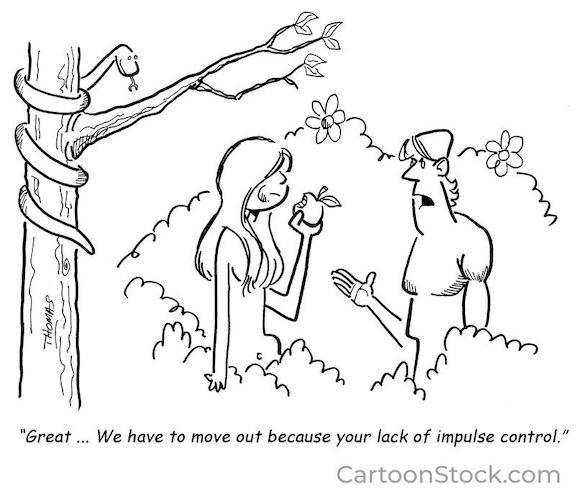Could your 4-year inner child pass the Marshmallow Test?

So there we were.
Three episodes deep into a very binge-worthy HBO series—you know, the kind with a cliff hanger in every episode?
Right as he unlocked the safe and grabbed for the NBA ring from the safe… the gun clicked from behind his head. Cliff hanger.
—I grab the remote… and paused to TV.
“I think it is time for bed.”
My girlfriend looked knowingly at me, determined not to fall for my anxiety inducing teasing for the second time that evening.
“Sure. I don’t need to see how this ends… if I were part of the marshmallow experiment as a child… I would have passed.
We laughed. She really does have much more ability to delay gratification than me. Nobody becomes a classical concert pianist without discipline and delayed gratification.
We did watch half of the next episode and realized our belove main character did not get shot or arrested. We went to bed a reasonable hour. Satiated… but we didn’t want all 8 episodes.
A BIT OF HUMOR

What’s The Marshmallow Experiment… Why does it matter to us?
Back in the late sixties, Walter Mischel sat a bunch 3-5 year olds in a research room, plopped a marshmallow in front of them, and basically said,
“You can eat this now… or wait fifteen minutes and get TWO marshmellows.”
Then he left them alone—with a treat, a clock, and their tiny prefrontal cortexes doing backflips.
Some licked it.
Some stared at the ceiling and practiced Jedi-level restraint.
Some? Full gobble-mode, three seconds in.
Years later… this little experiment became a psychology standard of success predictions. Guess which group of kids has better SAT scores, healthier relationships, and bigger bank accounts than the other group?
Yep—the ones who could resist temptation. The marshmallow masters of delayed gratification at age 5 got more wealthy and happier that those whose little brains made one decision differently thirty years earlier. Crazy right?
It’s Not About Sugar… It’s about the ability to see the future and forgo instant pleasure.
It’s about impulse control.
Broke and Addicted personality types live in a loop:
Temptation → Indulgence → Regret → Justification → Repeat.
And the only way out of the loop? Practice delayed gratification.
Turns out the ability to delay gratification is one of the strongest predictors of long-term success. In anything.
And today’s marshmallows? They don’t come in sugary form anymore. They come in the form of:
- That “Buy Now” button on Amazon.
- The snooze button.
- A glass of wine instead of a sales call.
- “I’ll launch it next month…”
- That third episode.
See, your brain doesn’t care about your goals. It cares about the hit. Dopamine now. Comfort now. Marshmallow now.
But success, residual income, building a business… That’s a game for people that can say to marshmallows.
There is a famous rock star named Gene Simmons from a band called KISS. He was one of the shrewdest businessmen the music industry has ever seen. I’ve seen him speak in public twice. I can’t say his general disposition or personality was to my taste. But I respect him. While some of his advice might seem harsh and cold…he preaches two key points I think are worthy repeating here.
He preaches the internal process of delayed gratification.
In 1984, Simmons bought his Beverly Hills mansion in cash for $1.35 million. In the previous eight years of making money on tour, he didn’t buy fancy cars or waste his money on alcohol or drugs. He sold that same home for $16 million in 2021. He didn’t borrow the money to buy it. He had the cash because he developed the habit of not spending money on short term pleasures. Here is some of his money advice from his book:
“Are you about to buy a new car? DON’T. (Do it later!)
Are you about to buy a new house? DON’T (Do it later!)
Do you want to vacation and enjoy life now, or do you want to amass a fortune now and vacation later?
In simple terms, try not to buy anything…especially what you don’t need. But if you buy, figure out a way to deduct it from your taxes.
Smart financial planning means always living below your means. Never live on the amount you actually earn – never.”

– Gene Simmons
See, your 5 year old brain doesn’t think about your long term goals. It cares about the hit. Dopamine now.
Today, your marshmallows are sneakier.
They show up as:
- “Just one more episode.”
- “I’ll buy in now on credit.”
- “I really need that new car to impress my neighbors.”
Discipline isn’t about being boring.
It’s about choosing later pleasure with bigger payoff… over now pleasure with short-term dopamine and long-term ‘meh.’
You don’t have to be a monk. You don’t have to never go on vacation or have fun.
You just have to recognize when your brain’s trying to trade your future version of your life for a cold tasty marshmallow today.
So here’s your assignment…yes, I assign homework once in a while. Sorry : (
Next time you find yourself with one of those “Now” decisions… Hit the pause button.
Ask yourself: “How good do I want to feel tomorrow morning?”
Put a $100 bill in your wallet and promise not to spend it for the next six months. Never. That will test you every time you open your wallet. Delayed gratification. Check. I can do that.
It’s not about the cookie or the thing today… it’s about training your brain for the bigger decisions you are thinking about today.
That’s how you rewire your brain.
That’s how wealth gets built.
That’s how great relationships, books, empires, and early retirement happen.
Oh, and if you do eat the marshmallow…
Eat it like a greedy 5 year old.
Enjoy every bite. Slobber. Laugh.
Then get back to building your Happy, Wealthy Mind.
Till Next Tuesday
Warmly,

Bart Baggett
Author of Happy Wealthy Mind, The Magic Question, Success Secrets of the Rich & Happy and Founder of the Life Design Academy